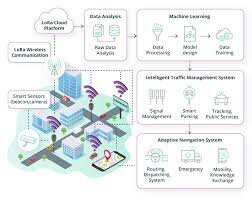Intelligent Traffic Management systems leverage Artificial Intelligence (AI) and the Internet of Things (IoT) to enhance urban mobility, reduce congestion, and improve safety on roadways. By integrating various technologies, these systems create a responsive and efficient traffic environment.
Key Technologies in Intelligent Traffic Management
IoT Sensors
IoT sensors are fundamental to intelligent traffic management systems. They provide real-time data on traffic conditions, vehicle speeds, and pedestrian movements. This data is crucial for understanding traffic dynamics and making informed decisions. For instance, adaptive traffic signals can adjust their timings based on live traffic data, leading to smoother traffic flow and reduced congestion[3][5].
Smart Traffic Signals
Smart traffic signals utilize AI algorithms to optimize traffic light patterns based on current traffic conditions. These systems can analyze data from connected vehicles and sensors to determine the best timing for green lights, thus minimizing wait times and improving overall traffic efficiency. By reducing idle times at intersections, these signals also contribute to lower emissions and improved air quality[4][5].
Video Monitoring Systems
Connected video monitoring systems enhance traffic management by providing visual data on traffic conditions. These systems can detect incidents, monitor traffic flow, and recognize patterns, allowing for quick responses to accidents or unusual traffic behavior. The integration of computer vision technology enables the automated analysis of video feeds, improving situational awareness for traffic management authorities[3][5].
Benefits of Intelligent Traffic Management
-
Reduced Congestion: By analyzing real-time data, intelligent traffic systems can implement measures that alleviate bottlenecks and optimize traffic flow, significantly reducing congestion in urban areas[4][5].
-
Improved Safety: AI-driven insights allow for quicker responses to accidents and hazardous conditions, enhancing overall road safety. Predictive analytics can identify potential risks before they escalate into serious incidents[2][4].
-
Environmental Impact: Efficient traffic management reduces vehicle emissions by minimizing idle times and optimizing routes. This contributes to cleaner urban air and supports sustainability goals in smart city initiatives[1][5].
-
Enhanced Commuter Experience: Real-time updates on traffic conditions help commuters make informed decisions about their routes, reducing travel times and improving overall satisfaction with urban mobility[4][5].
Conclusion
The integration of AI and IoT in traffic management systems represents a significant advancement in urban planning and transportation management. By utilizing smart technologies, cities can create safer, more efficient, and environmentally friendly transportation networks that cater to the needs of modern urban populations. As these technologies continue to evolve, their impact on traffic management will likely grow, paving the way for smarter cities.
Further Reading
1. AI in Traffic Management: Artificial Intelligence solves traffic control issues
2. Intelligent Traffic Management System: AI-Enabled IoT Traffic Lights to Mitigate Accidents and Minimize Environmental Pollution | IEEE Conference Publ…
3. What is a Smart Traffic Management System? | Symmetry Electronics
4. Avoiding bumps in the road when designing AI-powered traffic management systems – American City and County
5. AI and IoT: Transportation Management in Smart Cities – Blue Orange Digital


